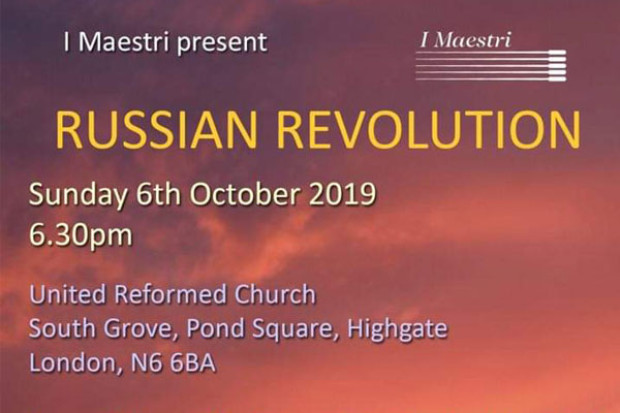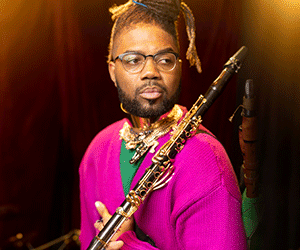
Russian Revolution
I Maestri present
Russian Revolution
Sunday 6th October 2019 6.30pm
United Reformed Church
South Grove, Pond Square, Highgate, London N6 6BA
Riccardo Romano Concerto for violin and orchestra
Sergei Prokofiev Violin Concerto no. 1, op. 19
Carmine Cancetta Rizzi, violin
I Maestri orchestra
conducted by Riccardo Romano and George Hlawiczka
We welcome the Italian violin Carmine Concetta Rizzi to perform two concertos, one well loved concerto by the Russian Prokofiev and one that has been written especially for this concert by Riccardo Romano titled "Movimento".
Prokofiev composed the concerto's opening melody in 1915, during his love affair with Nina Mescherskaya. The remaining movements were partly inspired by a 1916 Saint Petersburg performance of Karol Szymanowski's Myths by Polish violinist Paul Kochanski.
Its premiere in Paris was a relative failure, partly due to the work being overshadowed by Stravinsky's more modish Octet. The Concerto's premiere had also been delayed some seven years after it had been completed, due to Prokofiev's itinerant existence at that time and the difficulty in finding a soloist. Had the premiere taken place in Petrograd in 1917, as initially planned, Kochanski would have taken the part. By 1923, however, Kochanski was unavailable for the scheduled Paris premiere. Bronisław Huberman would not even look at the score. Nathan Milstein was still in Russia. The violinist who finally tackled the solo part was Sergei Koussevitzky's concertmaster, Marcel Darrieux; although not famous, he was a solid musician and a more than able violinist, which was all that was necessary for a performance (Darrieux also premiered Kurt Weill's Concerto for Violin and Wind Instruments in 1925. Joseph Szigeti was in the audience, and was so impressed with the work that he took the Concerto into his repertory.
In Romano's "Movimento" the deep-warm opening chorale alternating with the solo creates a frame around which the violin's far-reaching lines revolves, at times evoking Bartok chromatism at others R. Strauss lyricism and eclecticism. With a harmonic texture characterised by progressions built over specific intervals cycles, the work's dramatic climax resolves in the last chorale, where both the harmonies and the solo converge and combine to bring resolution to the piece's long arch.
Myaskovsky symphony No. 22 is subtitled "Symphonic Ballad of the Great Patriotic War". It was completed on November 4, 1941, which is the first Soviet symphony about the war, before the Shostakovich. The work carried descriptive for each of its three movements titles, but Myaskovsky withdrew them before its release. He felt the music more as a meditation on human tragedy. Although the work is divided into three movements, they are performed without interruption, and is really compact, making it difficult to find the gaps between sections. It is written almost in the form of a symphonic poem.
We do hope you can come and join us for this exciting programme!









